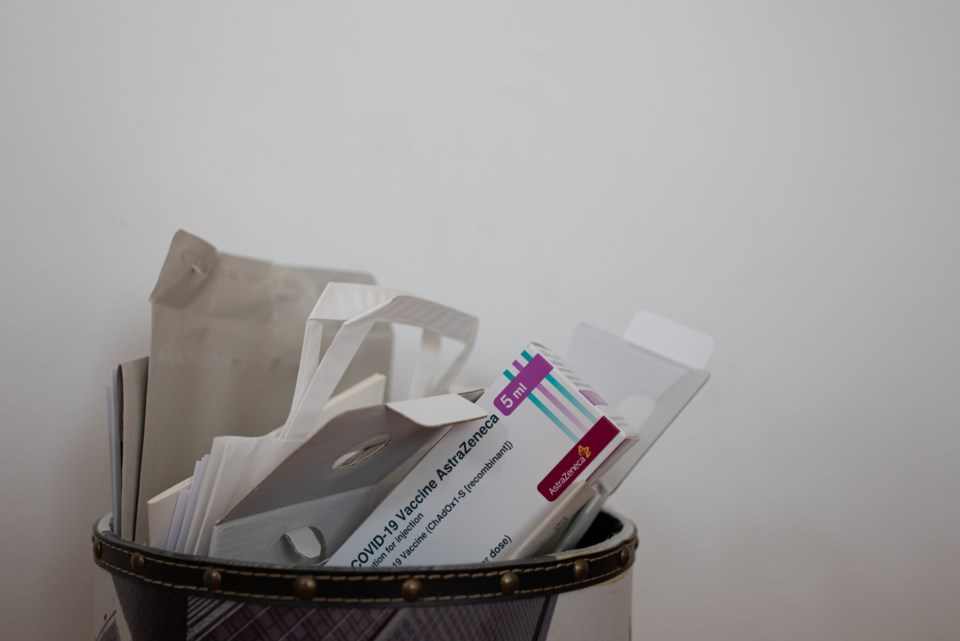The AstraZeneca vaccine is so precious in some countries right now that bidding wars are cutting into the scarce supply set aside for a vaccine sharing program in the poorest parts of the world.
Which makes it all the more incredible to hear this week that British Columbia is just tossing expired and unused AstraZeneca vials in the trash.
Health Minister Adrian Dix said Tuesday a “very small number” of doses were wasted in B.C. when they expired without anyone wanting to use them.
He blamed the federal government’s shifting recommendations on vaccines, which undercut AstraZeneca in mid-June by declaring the “preferred” vaccine for most people as an mRNA dose from Pfizer or Moderna.
The rationale was the small risk of blood clots from AstraZeneca. Health officials had spent weeks calmly explaining to the public the infinitesimally small risk was worth it if AstraZeneca was the first vaccine offered to you, before they were all taken out at the knees by the abrupt declaration by the National Advisory Committee on Immunization.
The result was a dramatic drop-off in interest for AstraZeneca by a bewildered and anxious public.
Fewer than 40 per cent of British Columbians who took AstraZeneca as a first dose followed through to get it as their second. Many simply waited for a different brand.
That meant some vials in the fridges of pharmacists expired and went into the garbage.
“We were cautious,” Dix said Tuesday.
“We had to make an assessment when we distributed AstraZeneca to pharmacies -- because it wasn't going to come back -- how much we would be able to use.
“As you rightly point out, there was a change in some of the advice we received from NACI in that time, which I think affected the amount of AstraZeneca we used.”
Exactly how many vaccines expired was not provided by the B.C. government, which said it was waiting for final accounting by the hundreds of pharmacists delivering those doses.
In some ways, this was to be expected.
B.C., like the rest of the world, created from scratch the most extraordinary vaccination program in its history in a matter of weeks, mobilizing thousands of health care professionals to deliver millions of doses at vaccination centres, pharmacies, mobile clinics, community centres, pop-up tents and other locations across the province. Mistakes were bound to happen.
But that doesn’t make it any less horrible to read the stories from across the world about millions of people unable to access proper vaccinations due to an AstraZeneca shortage.
It only serves to remind us how privileged we are in this province and country that we can “vaccine shop” different brands while throwing perfectly good life-saving medicine in the garbage during a global health crisis.
B.C. is not alone.
Thousands of doses of AstraZeneca are being wasted in provinces across the country, the Toronto Star reported this week. That includes as many as 10,000 in New Brunswick, and 4,000 in Alberta, for example. Ottawa has no plan to redistribute doses already sent to provinces before they expire, and there’s no real system in place for provinces to return unused vaccines back to the national centre so they could be shipped overseas to poorer countries, the paper reported.
That makes it likely we’re only at the beginning of more wasted AstraZeneca across this country.
Meanwhile, the World Health Organization’s COVAX program, which is supposed to share vaccines from the richest nations to help the poorest, reported it is failing to meet its targets because desperate countries are outbidding the WHO in the private market for AstraZeneca and cutting into COVAX’s supply, reports Reuters.
Part of the problem is India, one of the largest manufacturers of AstraZeneca under the name Covishield, choosing to prioritize its own domestic supply in April and causing a worldwide shortage that will linger until the end of this summer.
Many countries are getting insufficient amounts.
Others, like Nepal, have millions of people who received first shots of AstraZeneca now unable to get a second. They are watching the recommended 12-week gap between first and second shots fly by, without any idea when they’ll get another dose and what it will ultimately mean for their protection.
Canada announced this week it will donate almost 18 million doses of yet-unallocated AstraZeneca vaccine to COVAX, and start a donation-matching campaign to help pay for more international supply. The reason cited publicly by Procurement Minister Anita Anand is that provinces have told Ottawa they aren’t seeing any demand for AstraZeneca.
The donation is the least Canada could do, given that in May it exercised an option to take more than 655,000 doses of AstraZeneca out of the COVAX fund, set for poor countries, during the height of demand here for vaccines.
It’s sad and ironic to think that perhaps some of those very same vaccinations went to pharmacies across Canada and then into trash cans in provinces like B.C. because NACI scared the public into refusing to get the very vaccine Canada had snatched up and away from the poorest countries in the world.
We have a lot to be proud of in the way our province and country have vaccinated so many people in such a short amount of time. But also, some disappointments as well.
Rob Shaw has spent more than 13 years covering BC politics, now reporting for CHEK News and writing for The Orca. He is the co-author of the national best-selling book A Matter of Confidence, and a regular guest on CBC Radio.
SWIM ON:
- Rob Shaw: The bromance of NDP Premier John Horgan and Liberal Prime Minister Justin Trudeau puts federal NDP leader Jagmeet Singh in an awkward – and lonely – spot.
- Back in March, Katy Merrifield wrote about shots promised, shots that couldn’t be scheduled, and shots fired in media and the legislature.
- Jody Vance: In the drive for herd immunity, we need to get everyone – absolutely everyone – vaccinated. Even teens whose parents may be hesitant.



